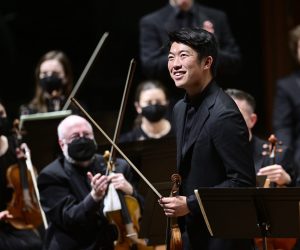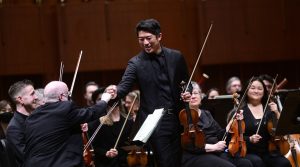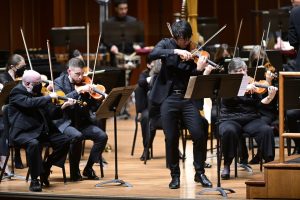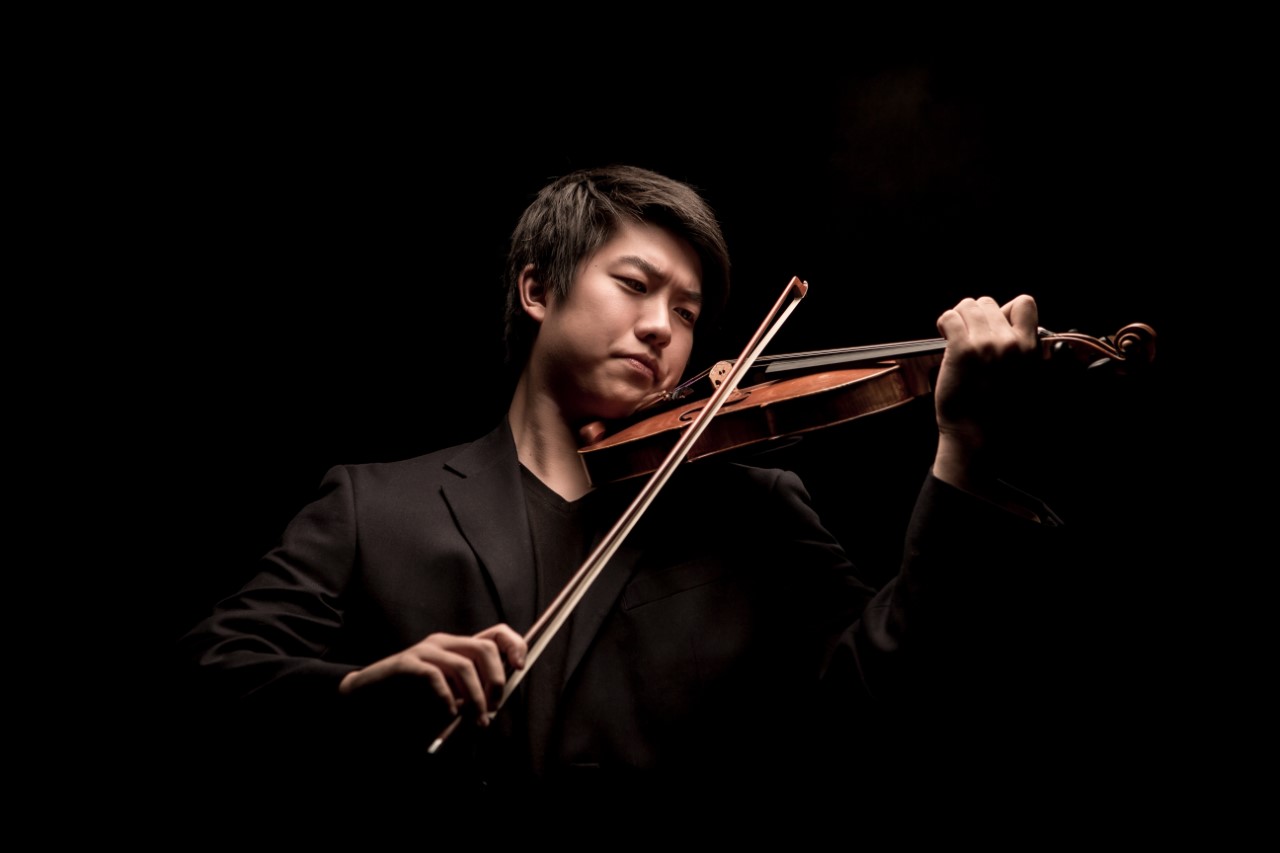ISO Concertmaster Kevin Lin Talks EDM, Equity, and the Future of Classical Music
Words by Kyle Long
Violinist Kevin Lin arrived in Indianapolis with great fanfare in 2020. Lin left his role as co-leader of the London Philharmonic Orchestra to take a position as concertmaster with the Indianapolis Symphony Orchestra. Lin shared the motives behind this decision during a recent conversation with CMI contributor Kyle Long. Lin also discussed his love for electronic dance music, the future of classical music, and the ISO’s 2023 concert season.

Kyle Long: You grew up in New York?
Kevin Lin: Correct, but people always give me a hard time about this. I was born in New York City, and for the first two years of my life I grew up in Washington Heights, But I have to have to be honest, my parents did move out to north Jersey, and a lot of my public schooling was done in Fort Lee, New Jersey, and Tenafly, New Jersey. So when people ask where I’m from, I just say I’m from New York City. I think that’s easier than giving this entire 15-second spiel that I’m actually from New Jersey.
Kyle: I’ve read that your dad was a scientist, and your mom had a background singing opera.
Kevin: Yes, my mom is a classically trained opera singer, and her love of music was instilled in me. My dad is a geneticist at Columbia University. So that’s why we ended up in that neck of the woods.
Kyle: What kind of music would you hear around the house? Was your mom singing often?
Kevin: Yeah, all of the time. My mom is a diehard fan of Sarah Brightman and Andrea Bocelli. So it was amazing last December when we had Andrea Bocelli come in. We were at Gainbridge Fieldhouse, and the ISO collaborated with Bocelli. My mom flew in for that, and I think that’s the proudest she’s ever been in my career. So I’m glad she was there to witness that.
Kyle: You were exposed to classical music from a very early age. At what point did you start playing yourself?
Kevin: My mom started me on piano around the age of two or three. It was not super serious, but it was something that was instilled in me at an early age. I went to public school in Fort Lee, and when I was six years old, a lot of our family friends started on the violin, so I wanted to as well. I was a bit of a competitive kid growing up. If I saw my friends do it, I wanted to do it. So that’s how I started on the violin.
Kyle: Classical music is filled with very adult ideas and emotions. Did the music speak to you as a kid? Did it make sense to you at a young age?
Kevin: To be totally honest, I hated practicing. I was told, “This is going to be good for discipline training”, or “This is something that’s going to help you on your college resumes”, and that’s kind of how it started.
My mom and dad sent me to music festivals when I was in middle school, it’s kind of like a sleepaway camp in the summer for classical music. I made some of my best friends at these places. There was the Kinhaven school in Vermont and the Heifetz Institute. These are basically one, or two-month programs that are out in the woods. As growing kids, you’re exploring yourselves and learning about yourselves, but using classical music as the medium. I’m still best friends with some of these people today. So that’s kind of how my love for music evolved.
Kyle: So your interest in classical music developed through your immersion in this social network?
Kevin: It was very much a social thing. That’s partly why I love doing what I do today. I get to connect and work with so many of my great friends, and that makes it really worth it.
Kyle: Do you remember if there was a specific point when the music started to make sense to you? Was there a breakthrough moment?
Kevin: Yeah, I remember very specifically in seventh grade, I was given an opportunity to play the Preludium and Allegro by Fritz Kreisler. I was given an opportunity to perform this with my middle school orchestra. I always knew I was good. I was proficient at the violin. But this is the first time where I stood up and played in front of my entire school. I played this solo, and the crowd went nuts. I will never forget it. I think that is the specific moment where I was like, “This is amazing. I love that feeling. I gotta continually chase for that appreciation.” I think it was at that specific moment, in public school music education, that kind of solidified what I wanted to do for the rest of my life.
Kyle: I read that you earned the nickname “Maestro” because of that performance.
Kevin: Correct, it was because of that concert. I was always just the kid that plays the violin, and Maestro sounds a lot better than the kid that plays the violin. So that was pretty cool.
Kyle: You came to international prominence in the classical music world in 2017, when you accepted a position as co-leader of the London Philharmonic Orchestra. You were just 24 years old at the time. Obviously, the London Philharmonic is a prestigious orchestra, and I’m sure there were quite a few veteran musicians in the group when you arrived. Was it difficult entering into that position at such a young age?
Kevin: Yeah, and honestly, I was very worried about it. I was young, and I was an American in a British orchestra. So there were more things going against me than for me. But also, being young rewards you, because you’re kind of oblivious to a lot of things. So I went in, put my head down, and did my job.
I think people enjoyed it. I had three very successful years there. I am still very good friends with my colleagues now. I learned so much. It’s a different world in London. We toured all the time. We went on one week tours to Japan. We did two week tours around Europe. We did Korea tours. We went all over the place. It was so much fun, but also so tiring at the same time. I basically learned the entire symphonic repertoire in three years. That’s how much repertoire we went through.
With all that knowledge, I thought maybe it’s time to come home. My family still lives in New Jersey, and a lot of my friends are in American orchestras. So I always knew I was going to make it back home at some point, and with three years under my belt, I felt like that was a pretty good time.
Kyle: I want to ask about your arrival here in Indianapolis. As you mentioned, you were with the London Philharmonic for three years when you accepted a position as concertmaster for the Indianapolis Symphony Orchestra. Some might view that as a step backwards. Did your colleagues find it strange that you were leaving London for Indianapolis? What drew you to Indianapolis?
Kevin: Of course, everyone was like, “Are you sure?” I was fully expecting that question, and I don’t regret my decision at all. I grew up in large cities. I went to school in L.A. and Philadelphia. I’m very used to the big cities. But there’s something amazing about Indianapolis. It’s incredibly welcoming and homey. I can go to my coffee shop, and it’s the same person that serves me coffee every day. There’s something very familiar and comfortable about that. Part of the reason I moved here is for a closer sense of community and friends – that’s something you don’t necessarily get in New York City, and Indianapolis has that in spades.
But also, what the ISO is doing is 100% on par with the quality of music that is being produced in London, L.A., and New York. We keep striving to be at the forefront of our game. I want to be part of a team that is perpetually improving, and that’s definitely what I see here. You know, it’s hard to always be the best, like in New York and in London. Sometimes it’s more fun to participate in the chase. So I’m having a very good time here.
Kyle: For our readers who aren’t immersed in the world of classical music, can you describe the work you do as concertmaster for the ISO? You’re a liaison between the conductor and the musicians, right?
Kevin: I see myself as a glorified traffic cop for the orchestra. We work with a different conductor and music director every week. So I’m there to bridge the continuity between the conductor and the rest of the orchestra. Given my past and my resume, I’ve worked with a lot of the conductors that are going to come and work with us. I know ahead of time what their personalities are, and what sort of musical ideas they have. So I translate that to the rest of the orchestra.
It’s hard to get 80 people to play together. I imagine it’s like driving a jumbo jet. You can’t turn on a dime, but if you instill enough influence, you can slowly make it work in the right way.
Kyle: If things go wrong, there could be a lot of drama and conflict in your job. Have you experienced that?
Kevin: Certainly, and I think I’ve accepted that fact. But that comes with any sort of leadership role. You’re the first one in and the last one out. The buck stops with you. If we don’t play well, that is my responsibility. We never blame the specific person, but we talk about the problems that arise. It is 100% my job to address those situations and fix them in the best way I can.
I have full faith in and confidence in the musicians that I work with – and in that regard, my job is not that difficult. They’re all highly qualified musicians who know exactly what they’re doing. I’m very lucky.
Kyle: Before we talk about the 2023 season, I wanted to ask a more general question about repertoire. An orchestra like the Indianapolis Symphony serves a large and diverse community with very different, and sometimes conflicting interests.
A large part of the audience wants to hear the familiar classics. There are people like me who want to hear new music by living composers. Also, there’s a growing demand to see orchestras perform more works by women and composers of color. Taking all those perspectives into consideration, what are your general thoughts on repertory?
 Kevin: I think you hit it right on the head. We need to have something for everybody. I think that’s a collaboration between our music director, our conductor, and our management team. This is why there are so many departments within the ISO. We have a pops department, we have a classical department, and we have a development department. The reason for all of these departments is so that we can make sure we are serving every demographic, and making sure that there’s something for everybody.
Kevin: I think you hit it right on the head. We need to have something for everybody. I think that’s a collaboration between our music director, our conductor, and our management team. This is why there are so many departments within the ISO. We have a pops department, we have a classical department, and we have a development department. The reason for all of these departments is so that we can make sure we are serving every demographic, and making sure that there’s something for everybody.
We hope that the audience will mix and match, and explore. We want our pop subscribers to listen to classical music. We want our classical subscribers to come to an Uncharted concert with Steve Hackman. No matter what we put on, we want people to have a great time.
I think we’ve definitely been more clued in, and keen on DIB (diversity, inclusion, and belonging), and performing works by people who have been underrepresented – not just composers. We also want to take a look at who we’re working with. We realize that a majority of the orchestra is white and Asian. We want to take a look at that and examine why that is. We’re going to strive to be inclusive and fair. We want to represent everybody.
We want to move away from being old, stiff, and stuck up. Classical music doesn’t always have the best reputation, but it really can be enjoyed by everybody. That’s the goal.
Kyle: There’s one concert in particular that I wanted to ask you about. In May, the ISO is performing the Florence Price “Piano Concerto” with pianist Lara Downes. Price was the first female Black composer to have their work performed by a major orchestra. On that same bill, you’ll also perform “Wood Notes” by William Grant Still, who has been called the “Dean of African-American Composers.” I’m curious if performing this work with the ISO has any special meaning for you?
Kevin: I’m actually really proud to be able to perform this sort of music. I say that like it’s not classical music, but it’s 100% classical music – it just hasn’t been part of our regular repertoire. I never played this in London. When I said earlier that I feel like I’ve learned everything in the classical music repertoire, this is where I’m stumped. Because there’s so much that we haven’t discovered yet. We’re very proud to be presenting this work, or else it wouldn’t be in our classical series.
Kyle: Are there any other highlights from the upcoming season that you’re excited about?
Kevin: Well, in January, there’s going to be a change in guard. Our resident conductor Jacob Joyce is going to be conducting his last concert with us before he moves on to other opportunities. He’s going to be conducting Nielsen’s Fourth Symphony. That’s going to be a raucous and bombastic piece. That’ll be a lot of fun to listen to. Also, we have Joshua Weilerstein coming back to conduct Mahler’s First Symphony. There’s so much to choose from.
Kyle: Are there particular composers whose work you look forward to performing, or do you just enjoy the challenge of performing all these diverse works?
Kevin: I love harmonies, very thick and dense harmonies. So I really look forward to Rachmaninoff or Mahler. I’m a sucker for the classics, whether it’s Tchaikovsky or Brahms. That’s what’s been ingrained in my head. When it comes to Stills or Price – that’s also incredibly exciting, because it’s something I get to learn for the first time. I hope it becomes part of our regular repertoire.
Kyle: As we wind up here, I want to ask about your listening habits. I wonder if you have time for personal listening? Do you listen to music for enjoyment? As a music journalist, nearly everything I listen to relates back to my work. I don’t always have time for leisurely listening. Do you struggle with that? Are you constantly immersed in the upcoming repertory?
Kevin: I don’t often listen to classical music for fun. I think that’s because it’s what I do for work. I work out quite a bit, and for that I need something a little more upbeat. So I listen to a lot of EDM (electronic dance music) and pop music.
Kyle: Who are your go-to EDM producers?
Kevin: Martin Garrix, Tiësto, and Deadmau5 are some of the more classic ones. I’m also a diehard user of Spotify.
Kyle: Are you a fan of projects like Black Violin that mix elements of electronic and classical music?
Kevin: Yeah, absolutely, and I’m always looking for people who do electronic music mixes. Sometimes I’ll hear an EDM track mixed with Beethoven concertos or Rachmaninoff concertos – ah, it’s amazing! It hits differently.
Kyle: Finally, Kevin, I’m curious about your future. You’ve already achieved a lot in your career. Are there specific goals or projects that you’re working toward?
 Kevin: I’m very excited to see where classical music is going, because I believe a lot of things are cyclical. From the 1950s to the ‘70s, I think classical music had a golden period. During that time, it might’ve been hard to get a ticket to a classical music concert. It’s not necessarily the same now. Classical music is seen as an academic endeavor, as opposed to listening for pure enjoyment. I think that’s going to change. But we’re going to have to pivot, and do some work on the concert experience.
Kevin: I’m very excited to see where classical music is going, because I believe a lot of things are cyclical. From the 1950s to the ‘70s, I think classical music had a golden period. During that time, it might’ve been hard to get a ticket to a classical music concert. It’s not necessarily the same now. Classical music is seen as an academic endeavor, as opposed to listening for pure enjoyment. I think that’s going to change. But we’re going to have to pivot, and do some work on the concert experience.
I think there’s going to be a revival. I think people want to go out and enjoy themselves at night – especially post-COVID. So I’m very excited to see where the next 5 to 10 years lead, especially knowing that things are cyclical.







Leave a Reply